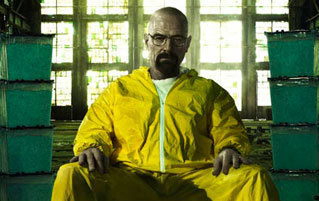4 Reasons Being a Pop Culture Nerd is Harder Than You Think

Pop culture -- all of it -- is something I like too much. I may have hated myself for watching Miley Cyrus prance around at the VMAs with the grace of a slutty car slamming into a tree, but secretly I loved it. I'm just as happy to have watched it as I was after watching any episode of Seinfeld, reading Preacher, or playing way too much Saints Row IV. Even when I dislike a pop culture moment, I still enjoy it; it's a shared experience. A certain movie or album or TV episode sucked -- so? Now we can talk about why it sucked! Break out the confetti and cake, 'cause that sounds like a goddamn party to me.
All that enjoyment comes with a set of downsides that mar the experience of saturating my brain with too much ultimately meaningless bullshit. Do you consider yourself a pop culture nerd like I and so many of us here at Cracked do? If so, then maybe you've noticed that ...
There's Too Much Stuff and Too Little Time

There's just too much great shit out there, stretching back decades. It's nearly impossible to catch up with the old great shit while still being up to date with the new great shit. There's no collective summer break for pop culture that lets us all catch our breath. It's a continuum of incredible experiences tempting you to partake. You can't, you shouldn't, but man, those eight identical seasons of Wings on Netflix need to be watched NOW. Life isn't as self-sustaining as a cat. From time to time it requires some of your attention.

To read all of The Walking Dead comics before the next season of the show starts while you finally watch The Wire while playing 100+ hours of Skyrim so you can get to Saints Row IV before Grand Theft Auto V comes out, all while trying to clear the 15-recording pileup on your DVR, means that you are the physical embodiment of the classic stereotype of a nerd: You have no life.
You've inundated yourself with pop culture, and for what? Just so you can say you've been there and done that? You made it all the way through a TV series, 90 percent of which you did in your underwear. You didn't climb Everest. No one will congratulate you. There's a tremendous relief that comes with realizing that none of this stuff needs to be experienced NOW. Or ever. But if you're a pop culture nerd, absorbing too much is what you do. You're not looking for accolades, just something to share with others like you.

"You guys talking about the war?"
"Uh, no, Aliens."
Shows, movies, comics, all that pop culture stuff used to fade away because we didn't have places to showcase them after their initial run. Your desire to experience them was filed away in the "Maybe when I die heaven will have a movie theater that plays all the things I missed" portion of your brain. We may not have cured AIDS just yet, but we've cured this problem, because ...
Nowadays, It's All So Easy to Get

For only eight bucks, Netflix throws every movie and show in existence at you. You can get dirt cheap used copies of stuff on Amazon. If spending money isn't your thing and you like it when people refer to you as a pirate, there are torrents.

"Ahoy, mateys! Thar be Season 4 of The Sopranos, but there be no seeders!"
It's become so easy for us to access pop culture that with no effort we can flood ourselves with it to our own detriment. There are two repercussions of this: The first is an effect called the burden of choice. That's when you are given so many options that choosing becomes an anxiety-filled chore. You feel it every time you open your packed refrigerator and close it despondently because there's nothing to eat. Netflix, Hulu, HBO GO, Comixology, iTunes, your TV -- it's all one "empty" overstuffed fridge after another.
We've so thoroughly eradicated the disease of boredom that we're fighting off the cure. DVRs were supposed to unshackle you from oppressive appointment viewing. Then you reshackle yourself by creating a nuclear stockpile of shows and movies so large, they could obliterate 10 Earths' worth of boredom in an instant. Why? Because you could, so you did.
The second repercussion affects fandom. When I saw Jurassic Park as a kid, I instantly developed a morbid obsession with it. I knew every line, every beat, every sound effect by heart. I cleaned my home relentlessly for weeks just so I could build up enough allowance to buy the behind-the-scenes books that were released in the pre-DVD-special-features era of human existence. I knew everything about Jurassic Park. I fucking WAS Jurassic Park.

Today, a kid could cover all those nerdy bases after about an hour's worth of Googling. You won't know a certain show or comic series exists on Tuesday, and by Friday you're getting a character portrait tattooed on your chest. You used to cram for tests; now you cram Mad Men. And you don't even need firsthand experience with something anymore. All the hard, embarrassingly detailed work that once went into being a superfan has been obliterated by Wikia pages that turn every pop culture pursuit into an easily searchable database. Streaming, on demand, and Wikis are the closest thing to Matrix-like instant brain downloads we have today.
The barrier of entry for superfandom has been lowered, so hardcore fans raised the bar by doing outlandish shit to prove their worth. So you got a tattoo of a video game character -- big deal. Do you get your recipes from a cookbook that instructs you on how to eat like your favorite fictional characters? Did you build an exact replica of a set from your favorite sitcom? No? Good. That means you're not a member of any ...
Militant Sects of Pop Culture Nerds

Minutes after finishing the latest book in the series that spawned HBO's Game of Thrones, I bathed myself in long-awaited fan theories and general discussion in the A Song of Ice and Fire subreddit. Once there, I noticed that the book readers tend to look down upon what they derogatorily call "show watchers," a title that has all the vague ominousness of a faction from the series. Once Game of Thrones became a hit, the Game of Thrones subreddit was filled with Faction A, people who are only watching the show, and Faction B, people who are watching the show and have read the books. Faction B people were spoiling everything, so the subreddit split off in two -- one for the show, one for the books. There are now two factions of nerds who share a common bond yet decided to give up trying to work together as a united nerd collective, instead choosing segregation.
Nerd civil war; a recursive loop of marginalized people marginalizing each other -- that's modern fandom. It's especially prevalent in the video game community. Want to start an Internet riot? Go into an IGN.com comment section and say that X console is better than Y. Post an anti-Call of Duty or anti-Electronic Arts image macro into r/gaming and watch your hate turn into commenter love like some kind of fucked up nerd alchemy.
With the mainstream success of comic book movies, sci-fi, video games, and the like, the pop culture nerds have won the culture war yet feel like there's still some fighting to be done. So they cannibalize each other in an effort to justify their amped-up defenses. No matter how much we have in common, we're always going to find something we can all agree to hate each other over. It takes some of the fun out of being a fan and makes it almost shameful.

But why does anything I've talked about so far even happen in the first place?
Pop Culture Peer Pressure

You know the Bible story about the Tower of Babel? In short, all of mankind spoke one language. We were so great at communicating with each other that we worked together to build a tower so tall, it could touch heaven. God looked upon the tower and said, with an amused, contemptuous eye roll, "Pfft! Yeah. OK ..." and made us all speak different languages, resulting in horribly translated movie subtitles.

Everything in the world of pop culture has its own built-in language filled with references, shorthand, gestures loaded with meaning -- all that stuff. Ding Ding Ding Ding Ding Ding Ding. Did you understand what I said there? If you did, it means you are fluent in Breaking Bad. Maybe you speak Firefly fluently ("Big damn heroes, sir"). Or BioShock ("Would you kindly ..."). Or Michael Bay movies (explosion sound).
That's where pop culture peer pressure stems from. If you want to understand your friends' conversations for the next couple weeks, you need to be able to keep up with whatever morsels of pop culture they've recently taken in. Their conversations about things you haven't seen yet will sound like the gibberish of someone about to have a stroke. Or they'll go the other way. You'll be the child the parents need to speak in cryptic code around. Friends will act conspiratorial around you, giving each other knowing nods and glances. They'll speak in short, vague sentences to not ruin anything for you. Maybe they'll even walk away from you to speak in secret like a bunch of dicks. All you want is to talk to people, but they don't want to talk; they might spoil something. If they do talk, you're a pop cultural foreign exchange student who never quite knows what the fuck everyone is laughing at.

than navigating a house party speaking only Season 1 Game of Thrones.
If all of this is making pop culture a pain in the ass to enjoy, there's a simple solution: Walk away from it. Walk so far away that you end up outside of your home. Stay there a bit. While there, do things that have nothing to do with saturating your brain with the stories other people tell. Make your own stories. Maybe one day you can write them down so some other media-saturated fools can fry out their brains with them.
Luis Prada has 329 unwatched movies in his Netflix queue and 16 unplayed games on Steam. You can find him on Twitter and Tumblr, and he's a columnist for Man Cave Daily.

